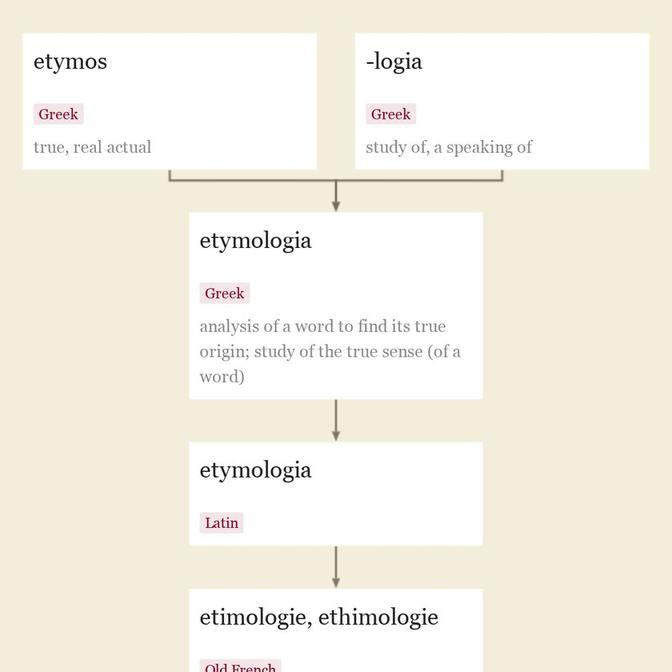folk-etymology (n.)
1882; see folk (n.) + etymology. Perhaps translating German Volksetymologie (by 1852). The German word was used in English by 1876.
By Folk-etymology is meant the influence exercised upon words, both as to their form and meaning, by the popular use and misuse of them. In a special sense, it is intended to denote the corruption which words undergo, owing either to false ideas about their derivation, or to a mistaken analogy with other words to which they are supposed to be related. [The Rev. A. Smythe Palmer, "Folk-Etymology," 1882]
Entries linking to folk-etymology
late 14c., ethimolegia "facts of the origin and development of a word," from Old French etimologie, ethimologie (14c., Modern French étymologie), from Latin etymologia, from Greek etymologia "analysis of a word to find its true origin," properly "study of the true sense (of a word)," with -logia "study of, a speaking of" (see -logy) + etymon "true sense, original meaning," neuter of etymos "true, real, actual," related to eteos "true," which perhaps is cognate with Sanskrit satyah, Gothic sunjis, Old English soð "true," from a PIE *set- "be stable." Latinized by Cicero as veriloquium.
In classical times, with reference to meanings; later, to histories. Classical etymologists, Christian and pagan, based their explanations on allegory and guesswork, lacking historical records as well as the scientific method to analyze them, and the discipline fell into disrepute that lasted a millennium. Flaubert ["Dictionary of Received Ideas"] wrote that the general view was that etymology was "the easiest thing in the world with the help of Latin and a little ingenuity."
As a modern branch of linguistic science treating of the origin and evolution of words, from 1640s. As "an account of the particular history of a word" from mid-15c.
As practised by Socrates in the Cratylus, etymology involves a claim about the underlying semantic content of the name, what it really means or indicates. This content is taken to have been put there by the ancient namegivers: giving an etymology is thus a matter of unwrapping or decoding a name to find the message the namegivers have placed inside. [Rachel Barney, "Socrates Agonistes: The Case of the Cratylus Etymologies," in "Oxford Studies in Ancient Philosophy," vol. xvi, 1998]
By late-14c. a sense had developed of "conjugation and categorization of words," apparently from a misunderstanding of etymology as dealing in tenses, and it is listed with prosody, orthography and syntax as an element of grammar:
...for the beginners of any language whatsoever, [etymologie] is so necessarie, that without it, they could not understand or learne it: The which by the Latin Grammarians hath beene, and is called Declension and Coniugation. [John Minsheu, "A Spanish Grammar," 1599.]
OED considers this sense to be "now historical." Related: Etymological; etymologically.
Old English folc "common people, laity; men; people, nation, tribe; multitude; troop, army," from Proto-Germanic *fulka- (source also of Old Saxon folc, Old Frisian folk, Middle Dutch volc, Dutch volk, Old High German folc, German Volk "people"). Perhaps originally "host of warriors:" Compare Old Norse folk "people," also "army, detachment;" and Lithuanian pulkas "crowd," Old Church Slavonic pluku "division of an army" (hence Russian polk "regiment"), both believed to have been borrowed from Proto-Germanic. Old English folcstede could mean both "dwelling-place" and "battlefield." According to Watkins, from PIE *ple-go-, suffixed form of root *pele- (1) "to fill," which would make it cognate with Greek plethos "people, multitude," and Latin plebes, "the populace, the common people." Boutkan thinks both the Germanic and Balto-Slavic could be a common borrowing from a substrate language.
Superseded in most senses by people. Generally a collective noun in Middle English, however plural folks is attested from 15c. Old English folc was commonly used in forming compounds (59 are listed in the Clark Hall dictionary), such as folccwide "popular saying," folcgemot "town or district meeting;" folcwoh "deception of the public." Modern use of folk as an adjective is from c. 1850 (see folklore).
Trends of folk-etymology
More to Explore
updated on January 27, 2022
Trending words
Dictionary entries near folk-etymology
foliation
folic
folio
folium
folk
folk-etymology
folkie
folklore
folkloric
folklorist
folk-music

